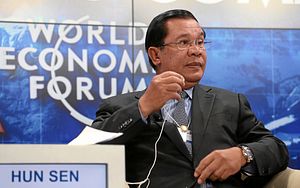From October 12 to October 17, Cambodian prime minister Hun Sen was in China for a series of meetings, including one with Chinese president Xi Jinping to strengthen Sino-Cambodian relations.
While in China, Hun Sen attended the Global Tourism Economy Forum Macao 2015, the Asian Political Parties’ Special Conference on the Silk Road, the 2015 Global Poverty Reduction and Development Forum, and the 6th Xiangshan Forum – China’s newly upgraded security forum that some characterize as Beijing’s answer to the Singapore-hosted Shangri-La Dialogue. But the highlight of the trip was his meeting with president Xi on October 15, which saw the signing of several agreements.
Hun Sen’s visit focused on a number of areas. Chief among them was infrastructure and China’s “Belt and Road” initiatives. The statement from China’s foreign ministry on Hun Sen’s meeting with Xi specifically mentioned his attendance at the Silk Road conference. The statement also added that Cambodia “renders full support and hopes for comprehensive involvement in the ‘Belt and Road’ initiatives proposed by President Xi Jinping.”
A related area is tourism and culture. During his remarks on the opening day of the 2015 Global Tourism Economy Forum, Hun Sen noted the link between this and the Silk Road: “Cambodia gives priority to the development of the tourism and cultural sectors, due to those sectors not only supporting economic growth by creating jobs and reducing poverty, but as something to be considered as playing a key role in supporting regional integration,” he said.
Tourism is an important sector for Cambodia, particularly as it relates to China. The industry contributes around $3 billion to the economy, and, according to Hun Sen, around 80 percent of that is cultural tourism – with visitors flocking to renowned heritage sites like Angkor Wat. As the Phnom Penh Post reported, Cambodian authorities are formulating strategies to carve out a larger share of the Chinese outbound tourism market – aiming to draw over 700,000 Chinese visitors this year and up to 2 million a year by 2020. Per national tourism statistics, China recorded the second-largest number of tourist arrivals to Cambodia in 2014, with its 560,000 coming just behind Vietnam.
More generally, China-Cambodia economic ties were also strengthened during Hun Sen’s visit and meeting with Xi. According to a post on Hun Sen’s Facebook page, China pledged to: import 100,000 tons of rice from Cambodia annually beginning in 2016; construct a hospital in Tbong Khmum Province, and give Cambodia a 1 billion yuan (around $157 million) grant, most of which would go towards the construction of a massive sports and entertainment complex in Phnom Penh. Also, while Hun Sen was traveling abroad, China’s ambassador to Cambodia Bu Jianguo handed over $126,000 worth of office equipment – including computers, laser printers and photocopiers – to boost the capacity of Cambodia’s foreign affairs ministry.
There was very little made public on the defense and security side during Hun Sen’s latest visit to China. The premier spent much of his keynote address at the Xiangshan Forum focusing on the role of various powers in the Asia-Pacific and Cambodia’s desire to see positive relations among them in the interest of greater security and stability.

































